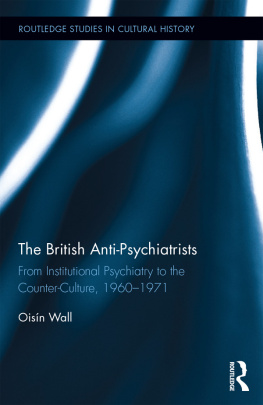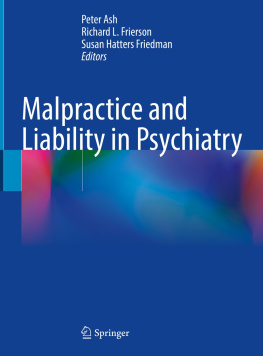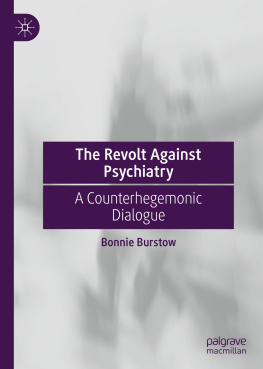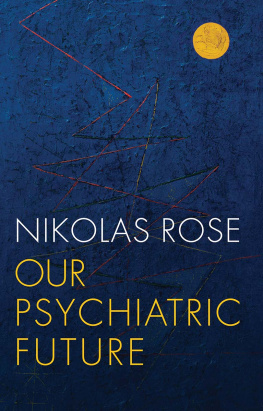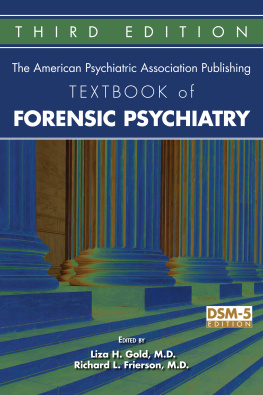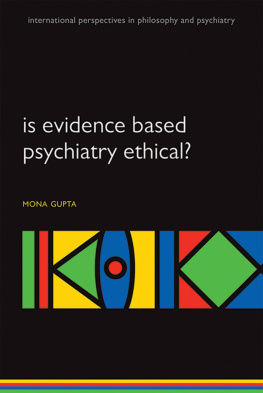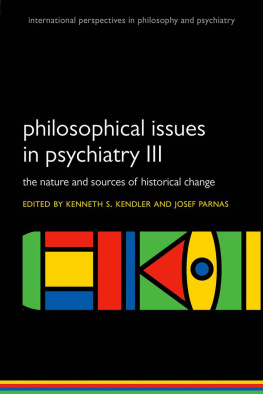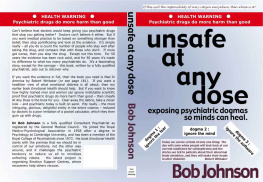The British Anti-Psychiatrists
The British anti-psychiatric group, which formed around R. D. Laing, David Cooper, and Aaron Esterson in the 1960s, burned bright, but briefly, and has left a long legacy. This book follows their practical, social, and theoretical trajectory away from the structured world of institutional psychiatry and into the social chaos of the counter-culture. It explores the rapidly changing landscape of British psychiatry in the mid-twentieth century and the apparently structureless organisation of the part of the counter-culture that clustered around the anti-psychiatrists, including the informal power structures that it produced.
The book also problematises this trajectory, examining how the anti- psychiatrists distanced themselves from institutional psychiatry while building links with some of the most important people in post-war psychiatry and psychoanalysis. The anti-psychiatrists bridged the gap between psychiatry and the counter-culture and briefly became legitimate voices in both. Wall argues that their synthesis of disparate discourses was one of their strengths, but also contributed to the groups collapse.
The British Anti-Psychiatrists offers original historical expositions of the Villa 21 experiment and the Anti-University. Finally, it proposes a new reading of anti-psychiatric theory, displacing Laing from his central position and looking at their work as an unfolding conversation within a social network.
Oisn Wall is the Research Curator of the Medicine Galleries at the Science Museum, London.
Routledge Studies in Cultural History
For a full list of titles in this series, please visit www.routledge.com
45 Enlightenment and Political Fiction
The Everyday Intellectual
Cecilia Miller
46 Madness in Cold War America
Alexander Dunst
47 Minor Knowledge and Microhistory
Manuscript Culture in the Nineteenth Century
Sigurur Gylfi Magnsson and Dav lafsson
48 The Problem and Place of the Social Margins, 13501750
Edited by Andrew Spicer and Jane L. Stevens Crawshaw
49 Electroconvulsive Therapy in America
The Anatomy of a Medical Controversy
Jonathan Sadowsky
50 A Cultural History of Sound, Memory, and the Senses
Edited by Joy Damousi and Paula Hamilton
51 The Romantic Idea of the Golden Age in Friedrich Schlegels Philosophy of History
Asko Nivala
52 Student Revolt, City, and Society in Europe
From the Middle Ages to the Present
Edited by Pieter Dhondt and Elizabethanne Boran
53 Respectability as Moral Map and Public Discourse in the Nineteenth Century
Woodruff D. Smith
54 The British Anti-Psychiatrists
From Institutional Psychiatry to the Counter-Culture, 19601971
Oisn Wall
The British Anti-Psychiatrists
From Institutional Psychiatry to the Counter-Culture, 19601971
Oisn Wall

First published 2018
by Routledge
711 Third Avenue, New York, NY 10017
and by Routledge
2 Park Square, Milton Park, Abingdon, Oxon OX14 4RN
Routledge is an imprint of the Taylor & Francis Group, an informa business
2018 Taylor & Francis
The right of Oisn Wall to be identified as author of this work has been asserted in accordance with sections 77 and 78 of the Copyright, Designs and Patents Act 1988.
All rights reserved. No part of this book may be reprinted or reproduced or utilised in any form or by any electronic, mechanical, or other means, now known or hereafter invented, including photocopying and recording, or in any information storage or retrieval system, without permission in writing from the publishers.
Trademark notice: Product or corporate names may be trademarks or registered trademarks, and are used only for identification and explanation without intent to infringe.
Library of Congress Cataloging-in-Publication Data
Names: Wall, Oisn, author.
Title: The British anti-psychiatrists : from institutional psychiatry to the counter-culture, 19601971 / by Oisn Wall.
Description: New York : Routledge, 2018. | Series: Routledge studies in cultural history ; 54 | Includes bibliographical references and index.
Identifiers: LCCN 2017028237 (print) | LCCN 2017028969 (ebook) | ISBN 9781315170121 (ebook) | ISBN 9781138048560 (alkaline paper)
Subjects: LCSH: PsychiatrySocial aspectsGreat BritainHistory20th century. | PsychiatryGreat BritainPublic opinionHistory20th century. | PsychiatryGreat BritainPhilosophyHistory20th century. | PsychiatristsGreat BritainBiography. | CountercultureGreat BritainHistory20th century. | Social changeGreat BritainHistory20th century. | Public opinionGreat BritainHistory20th century. | Great BritainSocial conditions20th century.
Classification: LCC RC450.G7 (ebook) | LCC RC450.G7 W29 2018 (print) | DDC 362.2/10941dc23
LC record available at https://lccn.loc.gov/2017028237
ISBN: 978-1-138-04856-0 (hbk)
ISBN: 978-1-315-17012-1 (ebk)
Typeset in Sabon
by Apex CoVantage, LLC
For my mother and father who showed me the importance of stories.
Contents
I was fourteen when I first read my fathers copy of Knots and instantly fell in love with its poetry. Since then I have reread it countless times, and every time I have found something more in itexplorations of the complexity of society, individuals, the human lifecycle, and, of course, the knots that people can tie themselves in. Knots was my way into this project, although I did not realise it until the very end.
When I first proposed the PhD that this book is based on at the London Consortium in 2009, it looked very different. It spanned a century and a full continent. The proposal was to examine the liberatory engagements with madness in Europe between the 1870s and 1970s. After several meetings with my supervisor, Patrick Wright, and members of the consortium, this unwieldy and over-ambitious project was narrowed down to an examination of one philosopher and three avant-garde groupsFriedrich Nietzsche, the Italian futurists, the French surrealists, and the British anti-psychiatrists. I believed that by comparing the writings of these people I would be able to identify a set of relationships between them. At the outset it appeared as though there would be strong connections between these four sets of work, all of whom used the idea of madness as a liberatory force. It seemed clear that Nietzsches conception of the Overhuman was of pivotal importance to the development of the futurists; the route from futurism to surrealism, via Russian constructivism, seemed to suggest that more connections would emerge; and, equally, connections between surrealism and anti-psychiatry, via Alex Trocchi and the Lettrists, seemed to suggest a clear influence. However, every time I looked closely at these connections they dissipated. I felt like I was trying to catch smoke in my hands. Over the years that followed, the project continued to narrow until finally it was limited to the British anti-psychiatristsa single group over a single decade in a single city.
At every stage the decision to narrow the focus of the project was pragmatic linguistic difficulties, the tenuousness of connections between the groups, and the difficulty of writing such a diverse study while giving sufficient background and depth to each group. However, in retrospect it seems to me that my research was always narrowing to this focal point. The confluence of historical and personal circumstances made it inevitable. In the early years of my PhD I became involved in the anti-austerity protests. At sit-ins, marches, and university occupations, the model of the 1960s was regularly discussed, perhaps not always favourably. Groups like the University for Spontaneous Optimism modelled themselves on the Anti-University of London and its international counterparts; equally groups like the Carrotworkers Collective modelled themselves on the direct action committees that abounded in the civil rights movements in the United States and Ireland. On marches the slogan coined by the

